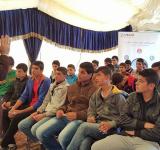Still in Search of Work,Creating Jobs for Syrian Refugees: An Update on the Jordan Compact
This report critically analyzes the progress achieved by the Jordan Compact,now two years into its implementation. The Jordan Compact was an agreement between the Jordanian Government,the World Bank,and the European Union (EU) in response to the growing strain Syrian refugees place on Jordan's infrastructure and economy that aims to improve the lives and livelihoods of Syrian refugees and vulnerable Jordanians. This report examines the progress made towards the Compact's goals,notes barriers still in place,and provides suggestions for moving forward in the future. The report lauds the steps the Jordanian government took in 217 to integrate refugees into the Jordanian workforces,such as extending work permits to refugees living in camps and delinking permits from employers in some sectors. However,the report also recognizes the need for continued progress. There remain restrictions on refugees’ ability to own,register and run small and home-based businesses and to access financial services,as well as a lack of refugee voices in decision-making around policies and programming which are barriers that appear to be slowing down the generation of livelihoods opportunities for refugees and Jordanians alike. Additionally,this report notes that the impact of the austerity measures implemented by International Monetary Fund seems to be counterproductive to making progress in Jordan. Ultimately,the report means to be a resource for governing bodies and Non-Governmental Organizations alike in Jordan to both inform and suggest improvements to the current situation.
